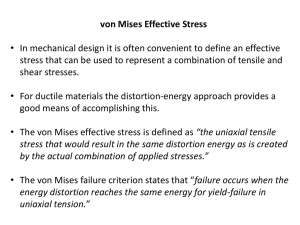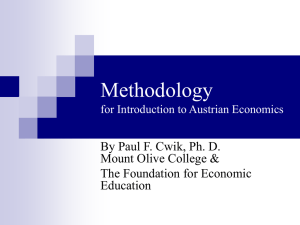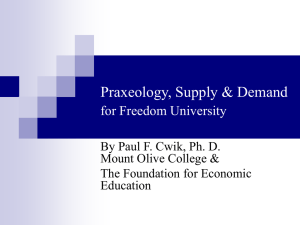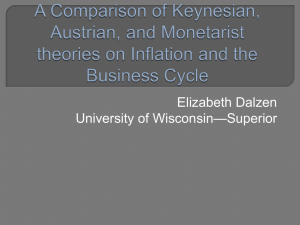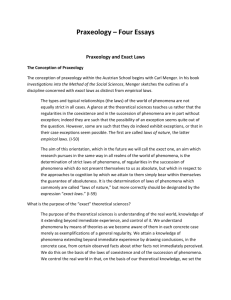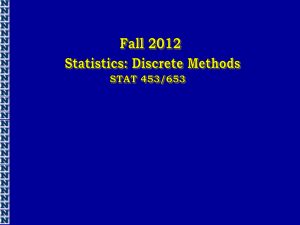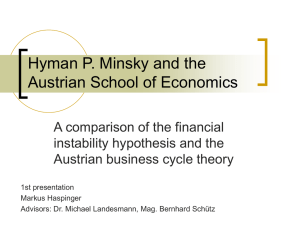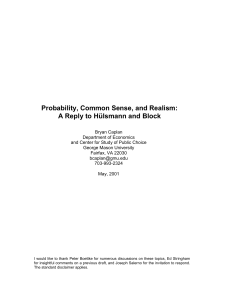Praxeology and Coercion, Word Doc.
advertisement
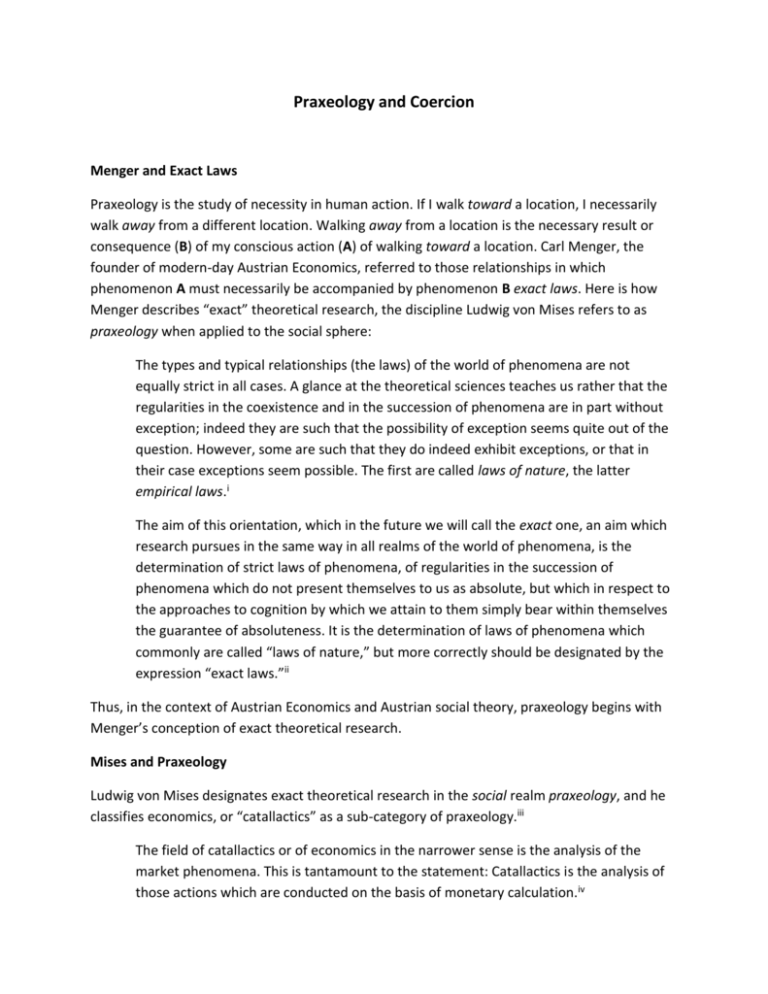
Praxeology and Coercion Menger and Exact Laws Praxeology is the study of necessity in human action. If I walk toward a location, I necessarily walk away from a different location. Walking away from a location is the necessary result or consequence (B) of my conscious action (A) of walking toward a location. Carl Menger, the founder of modern-day Austrian Economics, referred to those relationships in which phenomenon A must necessarily be accompanied by phenomenon B exact laws. Here is how Menger describes “exact” theoretical research, the discipline Ludwig von Mises refers to as praxeology when applied to the social sphere: The types and typical relationships (the laws) of the world of phenomena are not equally strict in all cases. A glance at the theoretical sciences teaches us rather that the regularities in the coexistence and in the succession of phenomena are in part without exception; indeed they are such that the possibility of exception seems quite out of the question. However, some are such that they do indeed exhibit exceptions, or that in their case exceptions seem possible. The first are called laws of nature, the latter empirical laws.i The aim of this orientation, which in the future we will call the exact one, an aim which research pursues in the same way in all realms of the world of phenomena, is the determination of strict laws of phenomena, of regularities in the succession of phenomena which do not present themselves to us as absolute, but which in respect to the approaches to cognition by which we attain to them simply bear within themselves the guarantee of absoluteness. It is the determination of laws of phenomena which commonly are called “laws of nature,” but more correctly should be designated by the expression “exact laws.”ii Thus, in the context of Austrian Economics and Austrian social theory, praxeology begins with Menger’s conception of exact theoretical research. Mises and Praxeology Ludwig von Mises designates exact theoretical research in the social realm praxeology, and he classifies economics, or “catallactics” as a sub-category of praxeology.iii The field of catallactics or of economics in the narrower sense is the analysis of the market phenomena. This is tantamount to the statement: Catallactics is the analysis of those actions which are conducted on the basis of monetary calculation.iv Though Mises lays out his conception of praxeology as a general science of human action in all its forms, it is only the economic (i.e., catallactic) sphere of human activity that is the focus of his own praxeological work. He has no knowledge of how the discipline of praxeology may be expanded to treat non-economic (non-catallactic) forms of human action.v The reason it has proven so difficult to conceive of a non-economic branch of praxeology is to be found in the assumptions made by economics, and the close historical association between economics (the study of market phenomena) and praxeology (the general study of human action). In studying the market economy, economics makes the special assumption of action taken in the context of identical monetary or commodity units. The assumption of identical monetary or commodity units introduces the possibility of mathematical treatment. Thus, when Mises discusses three important laws of economics (The Law of Marginal Utility, The Law of Returns, and The Ricardian Law of Association) we see that he introduces simple mathematical equations (n-1, p/c, 32p + 45q, 3/2 q, etc.).vi Economics is thus reliant on the assumption of identical units of supply and on mathematical equations for the formulation of its laws. The problem is that there are forms of human action that cannot make the assumption of identical units of supply, and therefore standard mathematics cannot be used in the attempt to formulate exact laws of these forms of human action. How one could formulate a nonmathematical, social, exact law, has remained an unsolved problem. Theoretical/Epistemological Problems in Mises’s Theory Mises’s conception of praxeology is that of a general science of human action that arrives at exact laws of human action. Praxeology is a theoretical and systematic, not a historical science. Its scope is human action as such, irrespective of all environmental, accidental, and individual circumstances of the concrete acts. Its cognition is purely formal and general without reference to the material content and the particular features of the actual case. vii Praxeological knowledge makes it possible to predict with apodictic certainty the outcome of various modes of action.viii There are at least two unresolved theoretical or epistemological problems in Mises’s system. First, if economics studies action under a given set of circumstances—circumstances that may or may not be present in other actions—this raises the question whether, strictly speaking, economics may be called praxeology. As Mises writes: [Praxeology] does not concern itself with the accidental and environmental features of this action and with what distinguishes it from all other actions, but only with what is necessary and universal in its performance.ix Praxeology is not concerned with the changing content of acting, but with its pure form and its categorial structure. The study of the accidental and environmental features of human action is the task of history.x In making the assumption of identical units of supply, it would appear that the economist specifies a concrete content of action that distinguishes a particular class of actions from all other actions. The particular content of action (in this case, identical monetary or commodity units) can change. But Mises is clear that praxeology does not deal with the changing content of action or with those things that distinguish one action from another. Thus, it is an unresolved question whether economics is to be considered a “branch” of praxeology, or a discipline that treats a concrete content of human action (e.g., history), or even a discipline of applied mathematics, or something else. Second, Mises conceives praxeology as arriving at exact laws of human action such that if action A is executed, result or consequence B must necessarily happen or occur. And he conceives that praxeological knowledge is valid not only within the deductive praxeological system, but valid also in the social “real world” in which we act. The theorems attained by correct praxeological reasoning are not only perfectly certain and incontestable, like the correct mathematical theorems. They refer, moreover, with the full rigidity of their apodictic certainty and incontestability to the reality of action as it appears in life and history. Praxeology conveys exact and precise knowledge of real things.xi Mises’s conception of praxeology as indicated in the above passage seems to be contradicted by his statements in other passages. For example: Apodictic certainty is only within the orbit of the deductive system of aprioristic theory. The most that can be attained with regard to reality is probability.xii And: For example, we deduce from our theory that when the price of a commodity rises, its production will be increased. However, if the expansion of production necessitates new investment of capital, which requires considerable time, a certain period of time will elapse before the price rise brings about an increase in supply. And if the new investment required to expand production would commit capital in such a way that conversion of invested capital goods in another branch of production is altogether impossible or, if possible, is so only at the cost of heavy losses, and if one is of the opinion that the price of the commodity will soon drop again, then the expansion of production does not take place at all.xiii Thus, it is unclear, given Mises’s conflicting statements, and given the example above, whether he conceives that deduced praxeological laws are apodictically certain only within the theory itself, or that deduced praxeological laws apply with apodictic certainty to “reality.” In the passage above, Mises is clear in speaking of a deduced, non-empirical, relationship between A and B. He then describes a possible scenario in which we assume that A happens and yet B does not happen. This means that upon the occurrence of A, phenomenon B may or may not happen, which is characteristic of an empirical, not exact, regularity. This theoretical conundrum is the reason why Hayek claimed that praxeology cannot be applied to market phenomena and that the study of market phenomena can only be the study of empirical regularities.xiv Praxeology as a General Science of Human Action As we’ve seen, in the context of Austrian School social theory, the idea of exact social science (what Mises terms praxeology) begins with Menger. Mises largely accepts Menger’s conception wherein each realm of knowledge may be approached from either the exact or the empirical standpoint. For example, there is the exact discipline of formal logic (the logic of propositions), the exact discipline of mathematics (the logic of the physical world and extended space), and the exact discipline of praxeology (the logic of human action). According to this vision, any subject matter may be approached formally as an “a priori” or “exact” discipline. Starting from this conception, it is relatively easy for Mises to see that most social scientists and social thinkers in his time are not engaged in formal analysis, but are engaged rather in historical, empirical, or normative studies. As he writes: “Up to now the only part of praxeology that has been developed into a scientific system is economics.”xv In other words, outside of economics, no one is attempting to approach the myriad social phenomena formally. In his writings Mises constantly reiterates his theoretical vision in which praxeology is conceived as a formal, exact, or a priori science that studies human action in all its forms. Economics, by contrast, studies only a circumscribed and delimited subset of human actions. In recent years it has finally begun to occur to those interested in Austrian School scholarship that the discipline of praxeology could perhaps be applied to social phenomena aside from market phenomena. The question is, why has it taken so long for Austrian scholars to take notice of Mises’s original vision of a formal discipline that extends beyond economics? The explanation has to do with Mises’s two most influential students, Friedrich Hayek and Murray Rothbard. Hayek Besides being Mises’s most capable student, Hayek had a deeper understanding of praxeology and subjectivist thought than any of Mises’s other students. Hayek’s two essays “Economics and Knowledge” and “The Facts of the Social Sciences” are important contributions in the field of praxeology and social theory generally. Because Hayek was both capable and knowledgeable, his opinion had influence. Hayek was of the opinion that though praxeology (which he called The Pure Logic of Choice) was an important analytical tool for understanding individual economic agents, it was inappropriate and inapplicable as a tool for studying the interaction between economic agents. Hayek drew the conclusion that therefore, praxeology was not an appropriate theoretical framework for studying market phenomena. What I see only now clearly is the problem of my relation to Mises, which began with my 1937 article on the economics of knowledge, which was an attempt to persuade Mises himself that when he asserted that the market theory was a priori, he was wrong; that what was a priori was only the logic of individual action, but the moment that you passed from this to the interaction of many people, you entered into the empirical field.xvi Thus, to the extent that Hayek had influence on the direction of Austrian scholarship, his influence served to direct Austrian scholarship away from Mises’s theoretical vision, and toward other approaches. Rothbard Rothbard is best described as a moralist in the sense that his chief interest as a libertarian social thinker is normative ethics. In libertarian ethics as it was practiced by writers such as Murray Rothbard and Ayn Rand, the aim is to demonstrate that if action A is performed, the actor who performs it will be bad, evil, immoral, or unjust.xvii By contrast, in the kind of social science practiced by Menger and Mises, the aim is to demonstrate that if action A is performed, then result or consequence B must necessarily happen. There is a vast difference between the formal and the normative approaches to social phenomena. Whereas Rothbard and Rand approach their subject matter in the spirit of a judge, Menger and Mises approach their subject matter in the spirit of a physicist. What confuses many about Rothbard is his advocacy of praxeology and his support of Mises qua economist. Rothbard advocated praxeology, but not because he understood it deeply or because he agreed with Mises’s scientific vision. Rothbard advocated praxeology because he supported the conclusions Mises reached regarding the market economy. Rothbard admired Mises’s defense of the free-market economy and sought to emulate it. As praxeology was part of Mises’s economics, when Rothbard took up Mises’s economics, he thereby took up praxeology. However, Rothbard never really understood praxeology as Mises understood it. In Mises’s theory, the regularity of phenomena, both social and physical, derives from the structure of the human mind: For, as must be emphasized again, the reality the elucidation and interpretation of which is the task of praxeology is congeneric with the logical structure of the human mind.xviii To a moralist such as Rothbard, this notion was entirely foreign. The idea that one could study social regularity by studying mental categories was not only puzzling, but such an approach ignored the most important goal of moralist social theory: the identification of enemy actors. In Rothbard’s mind, what was needed was a theory of libertarian ethics that could distinguish just from unjust conduct from a libertarian perspective. Once unjust actors could be identified with reference to an accepted theory of libertarian justice, they could be targeted with hostile actions in an attempt to stop them from aggressing upon libertarians. This was Rothbard’s overriding concern, and it was this concern that took precedence in his social theory. Rothbard advocated praxeology mainly as a foundational preamble or foundational rationale for lending support to the conclusions of free-market economics. He did not think of praxeology as a far-reaching discipline; instead, he thought of it as “the method of economics”—a distinct component of free-market economic theory. To Rothbard, praxeology was something written about in the beginning of an economic treatise that justified the conclusions expressed later in the treatise. That Rothbard had no interest in praxeology except as a foundational preamble to free-market economics is readily apparent. Rothbard’s defining life’s work, The Ethics of Liberty, was written after he had assimilated and reflected on Mises’s teachings. The subject matter of The Ethics of Liberty is the social sphere of politics, i.e., violence and non-violence used as modes of interpersonal relations.xix These are precisely the kinds of non-economic social phenomena that Mises conceived would one day become the subject matter of praxeological study. But though Rothbard had studied under Mises for several decades and wrote vigorously in defense of praxeology, he somehow overlooked the possibility of studying politics and interpersonal violence as a branch of praxeology. In fact, in The Ethics of Liberty, Rothbard explicitly distanced himself from both subjective value theory and value-free analysisxx (which taken together largely constitute praxeology),and he argued forcefully that Mises’s praxeological approach to social phenomena was deficient.xxi Regardless whether one is a proponent or opponent of Rothbard’s social theories, the scholarly paradigm he promoted and practiced (praxeology for economics, normative disciplines for interpersonal actions) had a wide and lasting influence on Austrian School scholars. This explains why there have been few, if any, attempts to extend praxeology until recently. Rothbard’s influence in this regard was aptly noted in a recent paper. An enduring puzzle facing readers of Ludwig von Mises is his view, stated for example in Human Action (1998, 3) that economics is the “hitherto best-elaborated part” of praxeology. Nearly 900 pages of economic theory follow, leaving no doubt as to the dominant initial position of economics as a branch. Rothbard speculates about the possibility of other “sub-divisions” of praxeology in Man, Economy, and State (2004, 72– 74). He distinguishes “praxeology and economics” from other fields such as ethics, psychology, and history. This is based on praxeology’s categorical interest in means and ends as such without reference to any particular means or end. However, such accounts of “praxeology and economics” leave little space for a sphere of content for praxeology to call its own, independent of economics. Rothbard writes that, “With praxeology as the general, formal theory of human action, economics includes the analysis of the action of an isolated individual (Crusoe economics)…” (74). While the proposed distinction appears to be between “general and formal” and greater specificity, this sentence could generate confusion because “Crusoe economics” is a fictional device to explain the most fundamental concepts of praxeology itself—from ends and means to production to time-preference. Rothbard’s comment comes at the end of the chapter called “Fundamentals of Human Action,” which uses Crusoe to explain the most fundamental praxeological concepts. This could leave the impression that “economics,” as represented by “Crusoe economics,” has on day one moved in to occupy all of the identifiable territory in this new land of praxeology, taking as its own any and all content that might otherwise be assigned to a core of praxeology itself—an independent core that could be shared with other possible “branches” or “subdivisions” besides economics. Unsurprisingly, economics has remained the dominant branch of praxeology decades later, and only a few writers have speculated on what other branches might be.xxii In the opening pages of Human Action, Mises the historian relates the bifurcation that existed in social science before modern subjectivist economics: Until the late nineteenth century political economy remained a science of the “economic” aspects of human action, a theory of wealth and selfishness. It dealt with human action only to the extent that it is actuated by what was—very unsatisfactorily— described as the profit motive, and it asserted that there is in addition other human action whose treatment is the task of other disciplines.xxiii(emphasis added) It was this same conception of the social sciences that Rothbard held, a conception that is only now being called into question. A Recent Attempt Now that scholars working in the Austrian School tradition are beginning to understand something about Mises’s vision of praxeology as distinct from Rothbard’s, nascent attempts to extend praxeology beyond economics are surfacing. One recent attempt is an essay entitled “An Outline of a Praxeological Theory of Politics” by Matei A. Apavaloaei. In his paper, the author argues that “politics/political science can be thought of as a praxeological sub-discipline, next to economics and praxeological ethics” and he attempts to delimit and define a praxeological field of politics. Apavaloaei’s thesis that politics can be thought of as a sub-discipline of praxeology is, of course, just a restatement of what Mises wrote in 1962. It would be preposterous to assert apodictically that science will never succeed in developing a praxeological aprioristic doctrine of political organization that would place a theoretical science by the side of the purely historical discipline of political science.xxiv As we have asserted, it was largely due to Rothbard that Austrian scholars were dissuaded or discouraged from pursuing Mises’s suggested theoretical approach. Apavaloaei, fifty three years later, will now follow up on Mises’s suggestion. The author’s main theoretical effort is an attempt to define politics as a branch of praxeology. Toward that end he provides the following definitions: Politics is going to be defined as the discipline that studies the logic implied by a specific form of human interaction: one individual living off the efforts of another by extracting his resources.(91) Politics as the field that analyzes coercive action aimed at extracting resources.(92) Politics analyzes the logic of coercion as it emerges from the interaction between an aggressor (bandit or state) and a victim.(110) Politics is interested in the logic of one individual living off the efforts of another.(110) Politics, on the other hand, considers only the aggressor as playing an active part in what concerns the use or threat of force. His goal is to extract resources.(110) The study of politics involves the application of praxeological reasoning to a specific human endeavor: the extraction of resources by coercive means.(111) The use of coercion as a means of one individual extracting resources from another.(115) We have defined politics as the discipline that studies the logic implied by a specific form of human interaction: one individual living off the efforts of another by extracting his resources.(120) From the definitions provided, we can see the intended meaning of the author. Libertarian social theory (as distinct from economics) is largely concerned with the use of coercion as a means of social interaction. In non-libertarian society, coercion, or the threat of coercion, is employed to “extract resources” from otherwise unwilling citizens. Citizens of non-libertarian society must pay taxes and fulfil various mandates or face imprisonment or physical harm. This is what the author has in mind with his definition of politics as one individual extracting resources from another by coercive means. The suggested definition—politics is the extraction of resources by coercive means—may be adequate in the context of a classroom discussion, or a debate, or a correspondence among fellow libertarians. In an informal setting, loose and imprecise definitions, or definitions containing moral or ethical connotations, may be acceptable. However, praxeology is a formal discipline, not an informal discussion about one’s preferred norms of conduct. What exactly is coercion? The answer will vary widely depending on whom one asks. A libertarian’s definition of coercion will be different from that of a socialist. A feminist’s definition of coercion will be different from that of a religious fundamentalist. An environmentalist’s definition of coercion will be different from that of a mining executive. In a theoretical context, if we have identified a phenomenon that we classify as coercion, is it not possible to define the essential characteristics of coercion in a formal sense? Is coercion something that only non-libertarians do to libertarians in order to “extract their resources”? Or is coercion something that everyone does at various times and places? Is coercion an activity that is only practiced by certain unethical people? Or is coercion a universal phenomenon of human action? It is unclear whether the author has done any thinking at all about the nature of coercion. And what precisely is “living off the efforts of another” or “extracting his resources”? If a mother instructs her child to do house chores and threatens punishment if the child refuses, does the mother meet the definition of politics intended by the author? If so, then this moves us in the direction of a more general and formal definition of politics. Then politics is conceived as something that everyone does at various times and places. If not, then the author’s proposed definition will need further distinctions and qualifications. As the author’s definition now stands, it lacks the formality required of a praxeological definition or category. The definition provided by the author is really just a loose restatement of the libertarian grievance vis-à-vis mainstream society: Mainstream society extracts our resources by coercive means. This is unfair! The Nature of Coercion If we are working in the Austrian School tradition, the first thing to make explicit is the distinction between the objectivist and the subjectivist account of social phenomena. Austrian School social theory was founded on the concepts of subjective value and methodological individualism. By contrast, in Rothbardian social theory, subjectivism, the concept of subjective value, and methodological individualism, are abandoned in favor of an (implicit) objectivist approach. It is a well-established principle of subjective action theory that the activity a person is engaged in is entirely a matter of the intention he is acting with.xxv It is easily seen that all these [social] concepts refer not to some objective properties possessed by the things, or which the observer can find out about them, but to views which some other person holds about the things…If we wish, we could say that all these [social] objects are defined not in terms of their “real” properties but in terms of opinions people hold about them…Whenever we interpret human action as in any sense purposive or meaningful…we have to define both the objects of human activity and the different kinds of actions themselves not in physical terms but in terms of the opinions or intentions of the acting persons…(Hayek, “The Facts of the Social Sciences”) What the person is really doing, or at least what he is trying to do, is entirely a matter of what the intention is that he is acting with…The explanation of an action must have the same content as was in the person’s head when he performed the action or when he reasoned toward his intention to perform the action.(Searle, Minds, Brains and Science) For it is obvious that an action has only one subjective meaning: that of the actor himself. It is X who gives subjective meaning to his action, and the only subjective meaning being given by [observers] F and S in this situation are the subjective meanings they are giving to their own actions, namely, their actions of observing X.(Schutz, The Phenomenology of the Social World) We can see a crown, i.e., a multitude of people. Whether this crowd is a mere gathering or a mass…or an organized body or any other kind of social entity is a question which can only be answered by understanding the meaning which they themselves attach to their presence. And this meaning is always the meaning of individuals. Not our senses, but understanding, a mental process, makes us recognize social entities.(Mises, Human Action) Thus, at the outset, we will make it explicit that our intention is to arrive at a subjective conception or definition of coercion, not an objective one. To arrive at a formal definition of coercion, we begin with the phenomenon of action. Generally, action is an attempt to attain a given situation or state of affairs. We will simplify this by saying that action is an attempt to attain X. I, as an acting subject, attempt to attain X. In addition to the things I attempt to attain (for example, walking right now to the other side of the room), there are things I believe I have attained (such as the house in which I am walking). That is, as distinct from those things I am pursuing, there are other things that I believe are in my possession, or that I can depend on in a certain way, such that I do not have to try to attain them. For example, I am safe right now (as I understand it), and thus I do not have to attempt to attain safety. I own a car right now (as I understand it), and thus I do not have to attempt to attain a car, and so on. We will simplify this by saying that as an acting subject, I have attained Y. As a conscious acting subject, I am familiar with these “categories of action” and I assume that these categories of action are the same for other beings whom I identify as acting beings (i.e., other humans). Thus, when I approach another being (A) that I believe to be an acting being, I have, or believe that I have, knowledge of the general workings of A’s mind or consciousness. I have several options in interacting with A. For example, I may try to help A attain the X I believe A is attempting to attain, or I may try to prevent A from attaining the X I believe he is attempting to attain. I may also offer to do an exchange with A, in which I offer to A the X that A attempts to attain (as I understand it) while A offers me the X I am attempting to attain. Yet another option is available to me. If I believe A has attained Y, I may try to make Y “unattained” for A, and then offer Y back to A in an exchange. For example, I may believe that A has attained comfort (i.e., A is not in pain). One of my options in dealing with A is to twist A’s arm in order to make the Y that was attained for A (comfort), something that A attempts to attain (comfort becomes an X for A), and then offer X back to A in an exchange. For example, I might twist A’s arm and command: “give me your money and I’ll let go of your arm.” When I do this, I perform the action that we identify as coercion. Thus, coercion, as we will conceive it, is a specific kind of trade or exchange. Coercion in our conception is not identical to violence, assault, fraud, or aggression. Coercion is a specific means that I may attempt to employ in interaction with another entity I believe to be an acting being. It is a specific interactive technique that I may employ, based on my first-hand knowledge of the workings of the action categories. We have thus arrived at a formal definition of coercion that is devoid of moral or ethical connotations. Whenever I, an acting being, attempt to make Y, which I believe A has attained, something “unattained” for A, and then offer that thing back to A in an exchange, I practice coercion. This definition of coercion is not only formal, but it is grounded in fundamental action categories. It is also a subjective definition of coercion that corresponds to the meaning of the action as the actor himself intends it (not a so-called objective definition of coercion rendered from the point of view of an observer). Lastly, our definition of coercion is “value free.” We make no attempt to judge whether the act of coercion is good or bad, just or unjust. We make no attempt to associate the phenomenon of coercion with a concrete political group or party. We only attempt to conceive the essential or universal aspects of the action of coercion. The goal is not to identify individual coercers so that we may correctly apply punishment in the political arena. The goal is to conceive coercion formally so that we may gain insight into the formal implications of this action. The Procedure of Praxeology A common conception about the procedure of praxeology holds that beginning with the “action axiom,” one proceeds by deductive or logical reasoning to draw further conclusions and implications. This conception, though partially correct, is not fully correct or accurate. When I, an acting subject, study human action, the primary starting point is not an abstract “action axiom” that I read about in a book or essay. The starting point for my studies is my first-hand experience of the phenomenon of action—the attempt to reach a goal—as I experience this phenomenon in my own conscious awareness. The scope of praxeology is the explication of the category of human action. All that is needed for the deduction of all praxeological theorems is knowledge of the essence of human action. It is a knowledge that is our own because we are men…The only way to a cognition of these theorems is logical analysis of our inherent knowledge of the category of action. We must bethink ourselves and reflect upon the structure of human action. Like logic and mathematics, praxeological knowledge is in us; it does not come from without.xxvi Furthermore, praxeological knowledge is not attained exclusively by applying a formal reasoning process, in chain-like fashion, to an assumed premise or axiom. For example, if I, an acting subject, attempt to coerce someone, this implies that I have located, in my conscious field, a being or entity I believe possesses the same consciousness categories I myself possess. When I locate such a being, I never actually observe any action categories or consciousness categories, though I believe these categories reside with the being I have located. These are two important praxeological insights, but they are not necessarily attained by an application of verbal mathematics to an assumed axiom of action. Rather, insights such as these may be attained by contemplating the nature, form, and patterns, of the conscious activity in question. Conclusion The social-scientific discipline that Ludwig von Mises named praxeology derives from Carl Menger’s conception of theoretical exact science. After the passing of Mises in 1973, praxeology, as a discipline that studies human action in all its forms, was not seriously pursued. This is because two of Mises’s most influential students had serious misgivings about Mises’s praxeological vision. Hayek believed that praxeology was not an appropriate framework for studying market phenomena and social interaction. Rothbard was primarily interested in ethics. He conceived praxeology narrowly as a kind of foundational reasoning or preamble that precedes the larger body of free-market economic theory. He referred to praxeology as “the methodology of economics.”xxvii Thus, when Rothbard turned to examine non-economic forms of human action such as violence and aggression, he abandoned praxeology altogether, along with theoretical subjectivism, methodological individualism, and the theory of subjective value—the core principles of Austrian School social analysis. Recently, libertarian writers sympathetic to Austrian Economics have begun to reexamine Mises’s conception of praxeology and have finally realized that praxeology as Mises conceived it is not synonymous with economics. Actions based on identical monetary or commodity units are only a subset of the actions we perform. All of our other “non-economic” actions, including direct, person-to-person interactions, can be the subject matter of praxeological study. It has taken over fifty years to reach this modest level of understanding. Unfortunately, just as praxeology is not the same as economics, objectivism is not the same as subjectivism. It was not only Mises’s classification scheme that was overlooked for decades, but just as importantly, the subjectivist approach. Methodological individualism is the theoretical technique of studying phenomena how they appear from the point of view of the individual actor, rather than how they “exist” in “objective reality.” When praxeology was abandoned, so too was theoretical subjectivism. If praxeology is revived, so too will subjectivism be revived. i Menger, Investigations into the Method of the Social Sciences, 1985, 50. Menger, 59. iii Mises, Human Action, 1966, 232-234. iv Ibid., 234. v See: Mises, The Ultimate Foundation of Economic Science, 2002, 98. vi Mises, Human Action, 119-130, 157-160. vii Ibid., 32. viii Ibid., 117. ix Ibid., 44. x Ibid., 47. xi Ibid., 39. xii Ibid., 105. ii xiii Mises, Epistemological Problems of Economics, 1976. 163. See: Knott, Hayek and Praxeology, 2013. xv Mises, The Ultimate Foundation of Economic Science, 43. xvi Hayek, Hayek on Hayek, 1994, 72. xvii Rothbard, The Ethics of Liberty, 1998, 12, 32. xviii Mises, The Ultimate Foundation of Economic Science, 65. xix Ibid., 25. xx Ibid., xlvii, 12, 26. xxi Ibid., 206-214 xxii Graf, “Action-Based Jurisprudence: Praxeological Legal Theory in Relation to Economic Theory, Ethics, and Legal Practice,” Libertarian Papers, Vol.3, Art. No. 19 (2011). xxiii Mises, Human Action, 3. xxiv Mises, The Ultimate Foundation of Economic Science, 98. xxv See: Hayek, “The Facts of the Social Sciences”, Searl, Minds, Brains and Science, 1984, p. 57-84, Schutz, The Phenomenology of the Social World, 1972, p. 32, Mises, Human Action, 1966, p. 43. xxvi Mises, Human Action, 64. xxvii Rothbard, “Praxeology: The Methodology of Austrian Economics,” 1976. xiv

